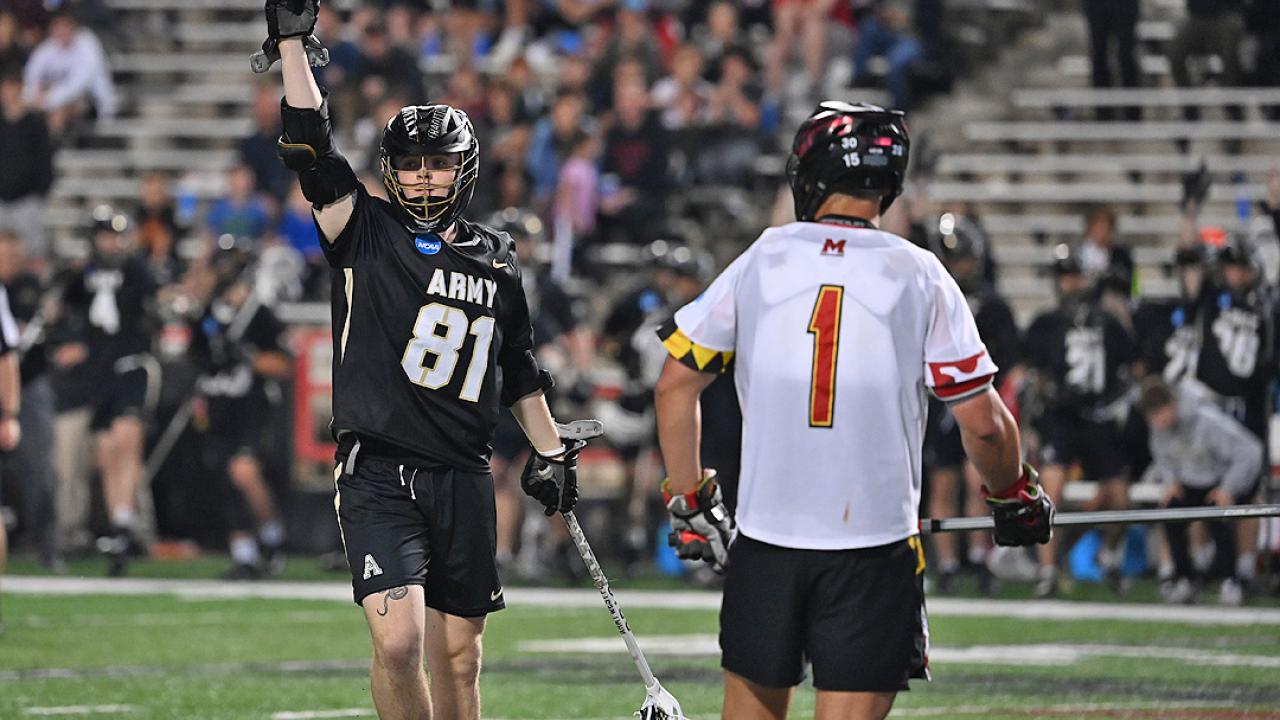Anyone drawing up a path for Army to win likely would have assumed it would have included quality play from Dent, a first-year starter in the cage; a roughly 50/50 day for Black Knights faceoff ace Will Coletti; and a methodical, grind-it-out approach Alberici’s team perfected while scoring between 10 and 12 goals in eight of its last nine games (and going 7-2 in those contests).
Well, two out of three isn’t bad. Dent indeed stole a few from the Terps, in the process overcoming a goal he accidentally kicked into the net. And Coletti went 17 of 35 against Maryland’s Luke Wierman, effectively preventing the Terps from tilting the field at any time other than the second quarter.
But the way Army won this game — especially down attackman Paul Johnson and midfielder Bailey O’Connor — was both impressive and unanticipated. Finn McCullough started in place of Johnson and blew by two different defenders for goals. Avi Mehl had a goal and an assist after entering with two goals and two assists. Mike Tangredi, playing in only his fifth game of the season, scored for the second time all year.
Even Alberici figured this would be a 10-8 or 10-9 tussle, right out of his team’s usual playbook. But then the game started, and Army kept winning matchup after matchup. It led 7-2 after a quarter, becoming the first team to score seven goals in a quarter on Maryland in a postseason game since Hofstra in the 2000 first round.
“It seemed clear early on that athletically, that we could put some pressure on them,” Alberici said. “We started moving a little bit away from the picking game because we were able to win a lot of those matchups. Eleven different guys scoring goals, we were coming at them from a lot of different directions.”
It was the most goals Maryland surrendered in the first quarter of an NCAA tournament contest since spotting Princeton eight early in the 1997 title game.
“Not a great way to start, digging ourselves a hole,” coach John Tillman said. “Seven goals in a quarter, we’re getting up to what we like to keep guys to in a game. It wasn’t one thing. Give them credit. They were opportunistic.”
Maryland rallied to tie it at 8 at the half, and briefly took a 12-11 lead into the fourth quarter before Army punched back with two scores. The Terps tied it up twice more, but Morin’s go-ahead goal coupled with Fellows’ insurance tally with 53 seconds provided a cushion.
A needed one, it turned out, since Daniel Kelly scored with 36 seconds left to get Maryland within a goal. Wierman won the ensuing faceoff, and the Terps got three shots off in the final 30 seconds. None were on cage, and when long pole Christian Fournier collected his sixth ground ball of the night and heaved it to midfield, Army had sealed the victory.
“They were able to get some shots off quick, and our guys were getting into the hands and forcing them to take some bad shots,” Dent said. “At the end of the day, the defense kind of bailed me out there. I didn’t get too many shots there at the end. Then Fournier came up with that huge ground ball at the end.”
It brought an early end to Maryland’s title defense and an unpredictable season. The Terps delivered some riveting victories — a signature triumph at Virginia in March and a payback victory at Johns Hopkins in the Big Ten semifinals among them — but also lost three games by at least five goals.
The kind of year the Terps had after graduating so much production wasn’t astonishing. Yet in a way it was jarring, considering they had reached the semifinals in nine of the last 11 NCAA tournaments and won two championships along the way.
Goalie Logan McNaney’s season-ending injury in February and the arm injury that cost defenseman Ajax Zappitello the last four games were fitting bookends for a team that figured to be more defense-centric from the start of the year but struggled to stay healthy.
Instead, as defenseman Brett Makar aptly put it during the Big Ten tournament, the Terps seemed to be held together by duct tape at times. And that’s probably not sustainable, even if they didn’t go quietly against Army.
“Lots of ups and downs, even tonight,” Makar said. “We didn’t start great, but the way we battled back summed up what this group did all year. Whether is it was injuries, guys battling back Monday to Friday to play on Saturday, I couldn’t be more proud of these guys. I know the program is in great hands. You saw a lot of guys grow up fast this year.”
So has Army. Look at the Black Knights’ production Saturday. Fellows? A freshman. Midfielder Evan Plunkett, he of the goal and three assists? A freshman. Mehl, Dawson Clark (who had an extra-man goal) and starting defenseman John Sullivan? All freshmen.
With help coming from so many places on the roster, it’s little wonder Army handled its own personnel issues so deftly — and earned another week together in the process.
“There wasn’t any sense of panic from anybody in the room,” Alberici said. “There was a great belief in the next guy, and it’s kind of how we’ve handled it this season.”



























































